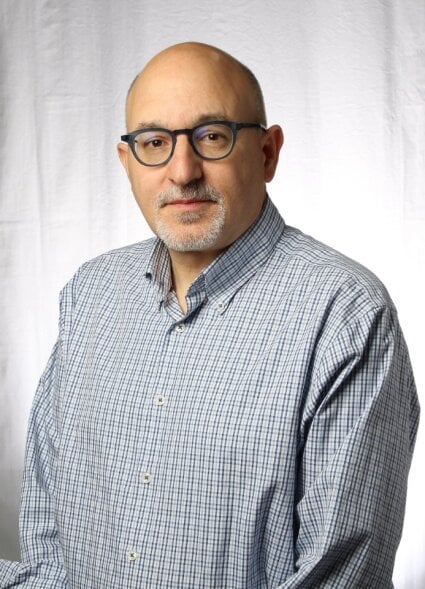
When Evan D. Rosen, MD, PhD, first began researching adipose biology many years ago, not much was known about it and its impacts on so many diseases. He talks to Endocrine News about how far the science has advanced regarding adipose tissue as well as his own lab’s research, the importance of collaboration, and why a laboratory is a lot like a submarine!
His significant contributions to unlocking the mysteries of adipose biology are numerous, yet Evan D. Rosen, MD, PhD, offers that he and his fellow researchers have just scratched the surface of possibilities in treating the diseases most impacted by adipose tissues.
Rosen has been recognized as the Endocrine Society’s 2024 Laureate for Outstanding Research — an annual award that honors the work of the late Roy O. Greep, PhD, that recognizes meritorious contributions to research in endocrinology.
Rosen is the chief of the Division of Endocrinology, Diabetes, and Metabolism at Beth Israel Deaconess Medical Center and professor of medicine at Harvard Medical School in Boston, Mass. His team of laboratory researchers aim to define novel targets that can be manipulated to improve outcomes in metabolic disease. They research the transcriptional pathways that underlie metabolic diseases like obesity and type 2 diabetes. They use genomic and epigenomic approaches to identify novel transcription factors and pathways that regulate processes such as adipogenesis, lipid handling, insulin resistance, and metabolic memory. His lab also created many mouse models that are widely used by the research community to study adipose tissue.
Endocrine News wanted to learn more about Rosen’s laboratory’s goals and the future of adipose research.
Endocrine News: What did hearing the news of the recognition for Outstanding Research mean to you?
Rosen: It was such a lovely feeling — so much of our work as scientists can feel isolating and self-contained. In many ways, the lab is like a submarine. We go dark for long periods of time as we puzzle through a project, surfacing every so often to communicate our results to the rest of the community. Winning the Greep award meant that someone was tracking our submarine, which is very gratifying and validating.
EN: Your work in helping to understand adipose biology is well recognized. How did you find yourself delving into this type of research?
Rosen: I was attracted to adipose biology because, when I started working in the field, so little was known. The first scientific meetings I attended only had a hundred people or so (compared to thousands now), and there was a sense that this was a really important area that had been overlooked for a long time.
So much of our work as scientists can feel isolating and self-contained. In many ways, the lab is like a submarine. We go dark for long periods of time as we puzzle through a project, surfacing every so often to communicate our results to the rest of the community. Winning the Greep award meant that someone was tracking our submarine, which is very gratifying and validating.
EN: I’m curious about your view on the progress that has been made since your early scientific meeting experience? Is it correct that the growth in numbers of researchers has led to promising collaborations, both nationally and globally? Are young researchers in your lab excited about their future of the field?
Rosen: Yes, there have been some terrific and productive collaborations, both within the adipose community and between adipose researchers and workers in other fields. One example of the former is the Human Cell Atlas Adipose Bionetwork (which I co-lead), and which is pulling the community together to develop standards for methodology and nomenclature. A lot of young scientists are interested in adipose tissue, so it certainly seems there is excitement in the field.
EN: We know how to treat diabetes (and, in most cases, prevent it) but what is the most important discovery still be unlocked in treating the disease? Meaning, is there a need for better medications or better treatment options?
Rosen: Adipose tissue impacts so many diseases — type 2 diabetes, of course, but also obesity, lipodystrophy, MASLD, hyperlipidemia, atherosclerosis, cancer, and more. All of these conditions could potentially benefit from therapies that manipulate adipose tissue biology. Despite the fact that there are already many medications for these diseases, they continue to cause a huge amount of suffering. So, there is absolutely a need for new treatments, and adipose tissue offers potential opportunities for tissue-based therapeutics. In many ways, we have just scratched the surface of what’s possible.
—Shaw is a freelance writer based in Carmel, Ind. She writes the monthly Lab Notes column.
The Endocrine Society honors Roy Orval Greep, PhD, (1905-1997) a Harvard University endocrinologist and scholar renowned for his seminal observations related to reproduction. Greep spent most of his career at Harvard, teaching anatomy, dental science, and endocrinology and histology, and serving as dean of the Graduate School of Dental Health. He was editor-in-chief of Endocrinology and edited two widely used textbooks on endocrinology and histology. Greep served as the 45th president of the Endocrine Society from 1965 to 1966.

